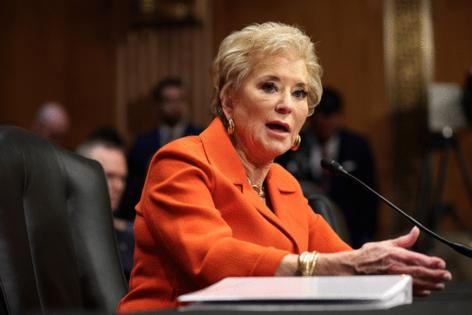Commentary: The real education revolution is happening at the state level
Published in Op Eds
While the nation’s attention is fixated on the confirmation hearing of Linda McMahon, President Donald Trump’s executive orders aimed at dismantling the Department of Education, and his directives to expand educational choice, the real change for students is not happening in Washington — it's happening in the states.
Just this month, Tennessee Gov. Bill Lee signed a bill into law creating an education savings account (ESA) with universal eligibility, creating the first of what is expected to be many choice programs enacted this year.
Texas could be next, as lawmakers there consider whether the Lone Star State should create its first ever choice program. If Gov. Greg Abbott has his way, it will be available to all students and constitute the nation’s largest school choice program in its first year.
But it’s not just Tennessee and Texas. States like Wyoming, Idaho, Indiana, Montana, and New Hampshire are also considering new or expanded school choice programs that offer broad, if not universal, eligibility for families. These initiatives underscore the fact that the parent-fueled revolution of recent years shows no signs of stopping. Education choice is spreading across the country, and state leaders are driving the charge.
Since 2021, the number of states offering universal eligibility in their choice programs has grown from zero to 14. In the current school year, more than 1.2 million students are participating in private school choice programs, a number that has roughly doubled from pre-pandemic levels. With 74 choice programs now on the books in 33 states and Washington, D.C. and Puerto Rico, about 40% of the nation’s students are eligible to participate in at least one of them.
This explosion in school choice programs has been fueled by the realization that a one-size-fits-all education system doesn’t meet the needs of every student. Parents across the country are demanding more options and flexibility, and policymakers are responding. The ability to choose the right school, whether public, private, or even homeschooling, is critical to ensuring that every child receives an education that meets their unique needs.
The impact of these programs has been profound. For many families, school choice offers a way out of underperforming schools. For other families, it provides the flexibility to choose a school that aligns with their values, their child's learning style, or their academic needs. Whether a family wants to send their child to a specialized school for gifted students, a religious school, or a school with a unique educational approach, school choice gives them the power to make that decision.
Moreover, these programs are increasingly being seen as a way to address systemic inequities in the education system. Minority and low-income families, who have long been disadvantaged by a lack of quality school options, stand to benefit the most from expanded school choice. Programs like ESAs are particularly powerful in this regard, as they allow families to use public funds for a variety of educational expenses, from private school tuition to tutoring or online learning tools. This financial flexibility is critical for families who otherwise would not be able to afford these options.
As pundits discuss the Administration’s focus on education in Washington, it is important to recognize that families must come first and that education is primarily a state function. We are simply falling too far behind as a nation, and unless we do something radical right now our children will not be prepared to take on the challenges of a global political economy. To fix abysmally low test scores, we must do something; empowering states to lead the way in education reform can’t come soon enough.
The future of education lies not in a centralized, one-size-fits-all system. It lies in a more flexible, decentralized model that prioritizes the needs of students. While federal policy may continue to play a supporting role, it’s states that are leading the charge, creating innovative solutions and empowering parents to make the best choices for their children. Moreover, as this movement continues to gain steam, it holds the promise of creating a more equitable and effective education system for all students, regardless of their background or circumstances.
This is the important work that the Trump Administration and Linda McMahon must undertake on behalf of all of America’s children.
____
Enlow is President and CEO of EdChoice, a 501(c)(3) nonprofit, nonpartisan organization working to advance educational freedom and choice for all students as a pathway to successful lives and a stronger society.
___
©2025 Tribune Content Agency, LLC.




























































Comments